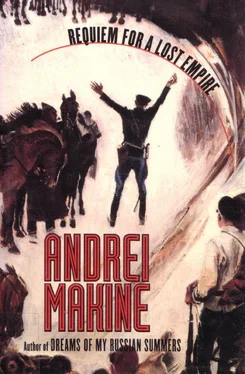The masses of water crashing against the cargo ship now seemed more rhythmical, as if resigned to the logic of the resistance offered them by this ludicrous vessel. I heard the counsellor get up and in the sudden flare of a match his face seemed to me aged, deeply etched. His voice had the slightly disappointed tone of someone who had been getting ready to spring a surprise but has missed the right moment to announce it: "Well, that's it. We're on the Red Sea. We won't be tossed about quite so much now." Perhaps it was slight irritation at having to break off his story to announce the news. He resumed it again but brought it to a swift conclusion.
"On account of our duels at chess Ethel nicknamed me 'Shakhmatov' or 'Shakh' for short. She knew Russian. There are only two or three people left who know this nickname… Goodnight!"
In the years that followed he occasionally spoke of the Rosenbergs again. One day he told me why, at the moment of their arrest, he was sure they would confess. "Because if I'd had those two children, that's what I would have done," he said.
With the passage of time, I also came to realize how his storytelling had allowed me to forget my fear, that egotistical and humiliating fear of losing one's life just when things are promising to turn out well.
Last of all, that night taught me Shakh's nickname, which was known to very few people. You were one of them.
Everything expressed by their voices, their bodies and, no doubt, their thoughts that night seemed to me tinged with theatrical exaggeration. Their excessively enthusiastic judgments in front of this statue, before that picture. Their smiles, contorted with too much happiness. And, behind these rapt expressions, the all-too-evident lack of attention to what they were being shown. And the overly urbane and almost gleeful hypocrisy with which they kept promising to meet for lunch one day. And the glances of the men, eyeing the women's figures quite blatantly, then immediately affecting icy indifference and poise.
At first I told myself that in an art gallery such an exaggeration of sentiments, either felt or simulated, must stem from the physical, and hence sensual, warmth of the works exhibited. A mistaken supposition, for the pictures 'were all bloodlessly and coldly geometric and the sculptures-cubes superimposed on one another and truncated cylinders-looked hollow despite the weight of their bronze.
I then attributed these excessive reactions to the schizophrenia of this city cut in two, divided like two hemispheres of a brain, each with its own very personal vision of the world, its own customs and foibles. Berlin, where the streets ran headlong into the Wall, then reappeared on the other side, both similar and unrecognizable. In the western hemisphere of this war-disordered brain people felt themselves to be charged with a special mission, none more so, I thought, as I made my way slowly through the crowd of them, than the guests at the very first exhibition in this new art center. In their eyes these great, brightly lit rooms were becoming an outpost of the Western World, confronting the alarming boundlessness of the barbaric lands that began beyond the Wall. Each of their gestures was projected onto the screen of the darkness that stretched away toward the east. Every word, every smile produced a reaction out there in that unpredictable blackness. Each truncated cylinder hurled defiance from its pedestal at the realistic paintings and sculptures of human forms that were being exhibited in the eastern hemisphere. The guests felt themselves to be observed by attentive eyes-jealous, hostile, or admiring. It was because of how they were seen from the other side of the Wall that they acted out these exaggerated emotions, going into ecstasies over a canvas, greeting a new acquaintance, sizing up a body or a face at a glance.
A waiter came and offered me champagne. I took the glass, thinking with a smile that what was almost a caricature of the Western World seemed like this because I was seeing it for the first time. I was still seeing it from beyond the Wall. It could not but be theatrical.
At the other end of the room, through the coming and going of the crowd, I caught sight of Shakh, dark suit, bow tie, his gray head inclined toward his interlocutor. I knew we should pretend not to know one another and that, just as he was leaving, someone would introduce us. This someone would be a woman whom I had never met but whom I should seem to have known for a long time. At the moment of this artificial introduction Shakh would be standing next to a dealer in rare stamps. In the most natural way I should make his acquaintance, so as to be able to meet one of his regular customers at his store a few days later, a specialist in arms sales and a passionate collector of stamps devoted to the world of flowers. Perhaps in the end it was our own playacting, woven into the worldly charade of that reception, that made me think of the theater. It was amusing to see the stamp dealer walking past within a few inches of me, not suspecting my existence. It was as if I were not merely hidden in the wings, but actually invisible on stage, among actors speaking their lines and playing their parts.
The feeling I had was a kind of highly lucid intoxication. I believed I could hear the intimate heartbeat of the Western life into which I must merge. This fusion had the discreet violence of carnal possession. I had to struggle mentally not to admit to being happy. This Berlin quintessence of the Western World was giving me back the aggressive lust for life I had thought was in terminal hibernation within me.
I had been aware of this reawakening already in Moscow, during the months of study and training, preparing me for my new work abroad. This preparation removed me further and further from the person I had been before. And it was not the fact of learning intelligence techniques or doing night parachute drops that confirmed this discontinuity. It was the pleasure of becoming a man with no past, of stripping myself down to this body trained for future action. Of being nothing but this future and, as for my past, to have only an invented life story, well rehearsed and learned by heart.
A couple stopped in front of a picture and I could hear the remarks of the woman, whose shoulder was almost brushing against mine. For her the pale spread of colors over the canvas was "You know, awfully strong, gutsy. And that red, you know, totally dominates the background." I turned my head slightly. Young, dark-haired, extremely elegant, her face truly transported by her contemplation. I admired her. All the Western World was there in this ecstatic hypocrisy in front of a feeble daub that had to be viewed as a work of genius. This shared lie was their unwritten constitution, the password to their social world, their genteel nonconformism. Their prosperity, the brilliance of this palace of the arts, and this woman's body, almost arrogant in its well-manicured beauty, were all underwritten by this unspoken agreement. As I looked at the woman, then at the picture, I experienced that mixture of fascination and disgust that the West had always aroused in the East. I was seized by a sudden impulse to squeeze the glass in my hand more and more tightly, to crush it, to see the couple turn around, to see the reflection of the blood in their eyes, to await their reaction with a smile.
At this moment I caught sight of you.
I saw a woman whose face was known to me thanks to the photos I had been shown during the final briefing for my mission. I knew her life, that borrowed life, as fictitious as my own life story, which she knew in her turn. She came in, not from the direction of the street, but through the vast bay window that opened onto a large garden. I had doubtless missed her first appearance in the room. And now she was returning after seeing the bulkiest of the sculptures exhibited in the open air.
Читать дальше










